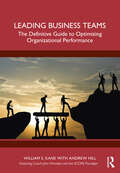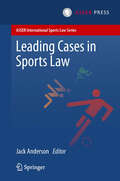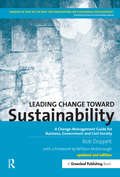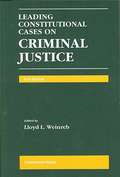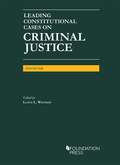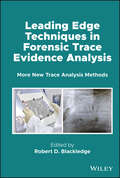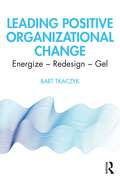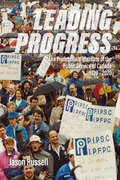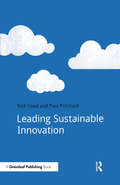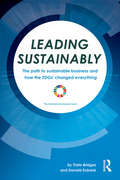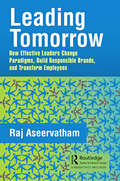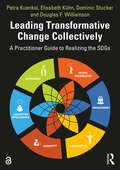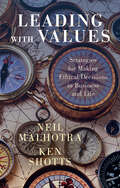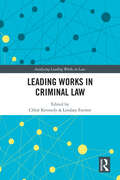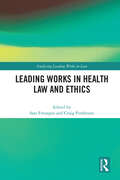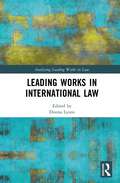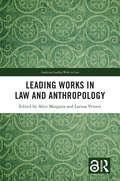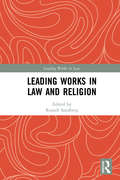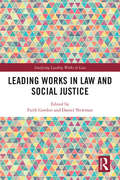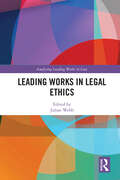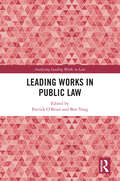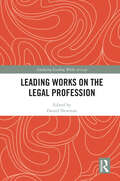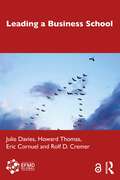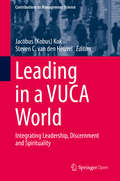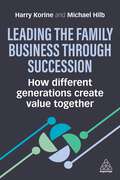- Table View
- List View
Leading Business Teams: The Definitive Guide to Optimizing Organizational Performance
by Andrew Hill William S. KaneIn a rapidly changing world, businesses must create a high-performing, metrics-driven workplace environment characterized by respect, inclusion, teamwork, innovation, and overall harmony—and it must be manageable and sustainable. This book shows that returning to managerial basics will provide the way forward, as exemplified by legendary UCLA basketball coach John Wooden, the model for a new people management pathway: the SCORE paradigm. Generally considered the greatest coach in history, John Wooden’s recipe for team success was unique, culture-based, and ahead of its time. Building upon Wooden’s 21 coaching principles and his own 35 years of experience as a human resources leader, Bill Kane has created the SCORE framework to guide people managers in creating and nurturing effective teams and steering their organizations through times of change: • Staffing: Attracting and selecting talent • Cultivating culture: Defining how people should interact • Organizing and planning: The need for direction and focus • Reinforcing desirable behavior: Managing performance • Engaging your team: A leader’s role and responsibility Enlivened with stories from the careers of Coach Wooden, Andy Hill (a three-time national champion under Coach), and the author, the book clearly explains why each coaching principle works in practice and provides examples of success, as well as pitfalls to avoid. Readers will learn how to get the right people on their team, create meaningful participative and inclusive management practices, build a winning organizational culture, and achieve heightened results. New and experienced people managers and leaders in corporate settings, as well as business and organizational psychology students, will appreciate this timeless reference tool, a roadmap to help people managers—as their own “work-in-progress”—develop strategies for success based upon a proven and simple model.
Leading Cases in Sports Law
by Jack AndersonThis book accounts for over 25 of the most influential cases in international sports law, as written by some of the leading authorities in the area. Authors from Europe, the United States, Australia, South Africa, Canada and New Zealand trace the evolution of this emerging discipline of law through an analysis of individual cases, as discussed under a number of key debates and themes in contemporary sports law, including: the "public" nature of legal disputes in sport; player employment mobility litigation; doping and the spirit of sport; TV rights holding proceedings; and enduring themes in sports law such as on-field violence, spectator safety, animal welfare and gender equality. Valuable for sports law academics, arbitrators and practitioners, sports administrators and governing bodies, but also for students (postgraduate and undergraduate) and all those with an interest in international sports law.
Leading Change toward Sustainability: A Change-Management Guide for Business, Government and Civil Society
by Bob DoppeltAs the world struggles to cope with the growing threat of a global carbon crisis, Doppelt has revised one of the best books ever written about change management, leadership and sustainability to focus on de-carbonisation. Doppelt's research, presented in this hugely readable book, demystify the sustainability-change process by providing a theoretical framework and a methodology that managers can use to successfully transform their organisations to embrace sustainable development. Filled with case examples, interviews and checklists on how to move corporate and governmental cultures toward sustainability, the book argues that the key factors that facilitate change appear in the successful efforts at companies such as AstraZeneca, Nike, Starbucks, IKEA, Chiquita, Interface, Swisscom and Norm Thompson and in governmental efforts such as those in the Netherlands and Santa Monica in California. For these and other cutting-edge organisations, leading change is a philosophy for success. Leading Change toward Sustainability has been used by change leaders around the world to guide their internal global warming and sustainability organisational change initiatives. This new edition is essential reading for leaders from all types of organisations.
Leading Constitutional Cases on Criminal Justice (2008 Edition)
by Lloyd L. WeinrebThis leading casebook provides Supreme Court cases generously edited for classroom use and presented in a simple, straightforward format. The casebook is updated annually. The new edition is published in August, in time for fall classes, and includes cases decided through the end of the preceding Term of the Supreme Court. Information will be forthcoming about cases decided in the current Term of the Court that will be included in the 2010 edition.
Leading Constitutional Cases on Criminal Justice (University Casebook Series)
by Lloyd WeinrebThe leader in its field, Leading Constitutional Cases on Criminal Justice is updated annually and includes all significant cases decided in the preceding Term of the Court. <p><p>Cases are edited generously and presented in a simple, straightforward format, for use in courses on constitutional law and criminal justice. The 2018 edition is published in August and is available for fall classes.
Leading Edge Techniques in Forensic Trace Evidence Analysis: More New Trace Analysis Methods
by Robert D BlackledgeLeading Edge Techniques in Forensic Trace Evidence Analysis In-depth exploration of the latest methodologies, tools, and techniques for analyzing trace evidence In Leading Edge Techniques in Forensic Trace Evidence Analysis, distinguished and highly qualified contributors cover the significant advances in methodology and instruments that are now being used to analyze trace evidence in forensic laboratories, including new techniques used to determine authenticity of objects and artifacts (such as Combined Raman/LIBS Microscopy) and those used to analyze surface treatments (such as py-GC-PARCI-MS). The work also covers new evidence types, such as surface-modified fibers, microscopic particles, and shimmer, and provides detailed explanations and practical examples of all of the aforementioned topics. Among the topics covered are: Forensic analysis of shimmer particles in cosmetics samples, glitter and other flake pigments, and x-ray photoelectron spectroscopy Surface acoustic wave nebulization mass spectrometry, forensic applications of gas chromatography vacuum ultraviolet, and spectroscopy paired with mass spectrometry Density determination and separation via magneto-Archimedes levitation and elemental imaging of forensic traces with macro and micro XRF Characterization of human head hairs via proteomics and Raman and surface-enriched Raman scattering (SERS) for trace analysis With detailed explanations of modern methodologies, tools, techniques, and evidence types in trace evidence forensics, along with helpful guidance to put covered concepts into practice, Leading Edge Techniques in Forensic Trace Evidence Analysis serves as an invaluable hands-on reference for scientists in forensic laboratories worldwide.
Leading Positive Organizational Change: Energize - Redesign - Gel
by Bart TkaczykAlthough many organizations see the need to transform and to reinvent themselves, for far too many leaders, ‘change’ and ‘failure’ are virtual synonyms. In fact, most organizational change efforts fail. But that needn’t be the case, and help is at hand. Leading Positive Organizational Change, an alternative way to think about organizational change and development, is a strategic, learnable discipline that can re-energize and re-imagine your enterprise, and release the potential for change – delivering a positive, creative future and breakthrough bottom-line results. Written by an award-winning expert in positive organization development and change leadership, this book provides executives, change leaders, and change leadership teams with a step-by-step guide for collaboratively crafting and executing a change strategy that aligns with organizational objectives so as to fuel their future. With a strong science-backed and field-tested ‘how to’ approach, and with a radical focus on organizational positivity, super-flexibility and renewal, collective design thinking and applied imagination, this highly practical book features: A ToolBox of 30 powerful, imaginative (and time-saving!) tools for you to use in practicing leading positive organizational change and carrying through your change program – with example templates and worksheets, concise notes and ideas from numerous complex global projects. Lead-ins to each chapter that are a fundamental feature of the book, representing a springboard to a chapter and serving the purpose of awakening interest in the topic. Dialogic Reflection for Professional Team Development, at the start of each chapter, that enables you (and your team as a whole) to reflect on and discuss some thought-provoking questions, linking to the chapter and helping to contextualize your learning. Industry Snapshots that explore current issues and trends in one of the fastest-growing professions and industries – coaching and consulting. Windows on Practice that demonstrate how issues are applied in real-life business situations, offering a range of interesting topical illustrations of positive change leadership in practice, relating the core concepts of the book to real-world settings. Summary Propositions, at the end of each chapter, that recap and reinforce the key takeaways from the chapter. References to help you take your learning and development further. Tkaczyk’s engaging, reflective, task-based book equips the change leader and leadership teams with the skills needed to navigate chaos and the unexpected, to renew your business and create winning change. This action-based workbook can be used in a variety of business settings, among others, executive leadership team meetings, organization development and change consulting, design-led strategy retreats, human resource development consultancy, executive 1:1 and team coaching, leadership boot camps, design thinking workshops and sprints, innovation labs, and executive education and MBA courses – as a handy additional text in either an organization development and change or human resource management class. It can also be used in a flexible strategic transformation program – with the flow of the change execution process mapped within the context of a specific change initiative.
Leading Progress: The Professional Institute of the Public Service Canada 1920–2020
by Jason RussellOn February 6, 1920, a small group of public service employees met for the first time to form a professional association. A century later, the Professional Institute of the Public Service Canada (PIPSC) is a bargaining agent representing close to 60,000 public sector workers, whose collective efforts for the public good have touched the lives of every Canadian. Published on the centennial of PIPSC’s founding, Leading Progress is the definitive account of its evolution from then to now—and a rare glimpse into an under-studied corner of North American labour history. Researcher Dr. Jason Russell draws on a rich collection of sources, including archival material and oral history interviews with dozens of current and past PIPSC members. The story that unfolds is a complex one, filled with success and struggle, told with clarity and even-handedness. After decades of demographic and generational shifts, economic booms and busts, and political sea change, PIPSC looks toward its next hundred years with its mission as strong as ever: to advocate for social and economic justice that benefits all Canadians.
Leading Sustainable Innovation
by Paul Pritchard Nick CoadSustainability will play an increasingly key role in the innovation process within businesses. Leading companies are already integrating these agendas, and preparing their sustainability executives to take the lead. This book demonstrates why sustainability requires innovation; explains how this opportunity can be grasped by sustainability executives; outlines the skills they will need to learn to lead on sustainable innovation; and outlines key trends in sustainable innovation and in managing innovation. Coad and Pritchard provide an overview of mainstream innovation, and draw out common characteristics of successful programmes, such as a corporate culture whose systems promote innovation. They highlight developments such as mobile technology, social media and collaborative consumption which transform the way consumers interact with companies. Viewed alongside emerging ideas on sustainability, such as the circular economy, this points to a clear need for a new set of innovation skills. Companies will face challenges in realizing these opportunities, in particular the development requirements for sustainability executives and broader organizational learning. This book is for companies who want to take advantage, and the sustainability executives who will be leading the way.
Leading Sustainably: The Path to Sustainable Business and How the SDGs Changed Everything
by Trista Bridges Donald EubankThe business world is at an important crossroads. The age of the stakeholder is rapidly superseding that of the shareholder as climate change and political and societal shifts upend years of seeming prosperity. To move past this agitated age, business and society must learn to lead sustainably by putting purpose on equal footing with profit. The first step is understanding what’s meant by sustainability and how it offers an opportunity for both business and society. Inspired by the launch of the 2030 United Nations Sustainable Development Goals (SDGs), the book captures the ideas of more than 100 change makers from around the world about how business is putting sustainability at the core of strategy to survive, thrive, and realign its interests with society’s. Leading Sustainably looks at how sustainability has evolved in a business context, offering powerful insights, key facts, and guidance on building sustainability capability within companies, measuring and managing impact, sustainable finance’s transformation, and other topics critical to aligning businesses’ central activities with sustainable principles. The book introduces five vignettes profiling best-in-class companies that were sustainable from the start and international case studies on business sustainability efforts, spanning industries from hospitality to waste management, fashion, finance, and more. Finally, Bridges and Eubank provide frameworks and in-depth direction firms can leverage when accelerating their transition to more sustainable business models. The book is a perfect guide for mid-level to senior managers seeking to understand this fast-changing business environment, how to factor sustainability into their decision-making, and why the SDGs changed everything.
Leading Tomorrow: How Effective Leaders Change Paradigms, Build Responsible Brands, and Transform Employees
by Raj AseervathamMaintaining good business leadership in a world of rapidly changing expectations levied by customers, investors, society, governments and employees is a challenge. These stakeholders are increasingly making choices about if or how they support businesses – through the purchase of their products and services, shareholdings and financing, regulatory approvals, and even experiences working for them – based on not just what a business does, but how it does it. We are seeing shifts in stakeholder sentiments that manifest in a greater expectation that businesses work with society in addressing society’s contemporary concerns. This greater good that businesses bring is rewarded by a greater brand awareness, connection and loyalty, which in turn provides businesses with an underlying strategic advantage over the competition with its customers, investors and other stakeholders. But this greater good cannot be faked with PR and bought media; in an increasingly connected world populated by an increasingly savvy millennial stakeholder base, authentic leadership and its ability to effect cultural shifts in the DNA of businesses is essential. Failure to do so will likely result in shorter and less successful tenures of Board members and C-suite leaders as this business trend spreads. This book looks at how the emerging generation of leaders must change paradigms and transform their employees to do more than just operate a business. It examines how to effect culture shifts that are necessary to innovate businesses so that they simultaneously meet market needs while meeting stakeholder expectations on concerns as varied as ethical business conduct, labor practices, climate change, responsible use of diminishing natural resources and contribution to socio-economic challenges in their market catchments. These are perspectives and skills that are still glossed over, by academic and professional institutions, as they develop the leaders of the future. Essentially, this book: • Articulates the strategic business case for doing good in a good business; the why, and where this trajectory is leading • Provides strategies to lead authentically on the array of issues that provide key stakeholders – customers, investors, governments and employees – with a greater reason to engage with and build loyalty to the business • Provides strategies to energize and spark innovation among his/her employees in an organization on these issues so that transformative power is harnessed.
Leading Transformative Change Collectively: A Practitioner Guide to Realizing the SDGs
by Petra Kuenkel Dominic Stucker Elisabeth Kuhn Douglas F. WilliamsonThis book directly helps decision-makers and change agents in companies, NGOs, and government bodies become more proficient in transformative, collaborative change in realizing the SDGs. This practitioner’s handbook translates a systemic – and enlivening – approach to collaboration into day-to-day work and management. It connects the emerging practice of multi-stakeholder collaboration to easily understandable models, tools, and cases. Numerous, concrete cases not only bring this methodology to life, but also help identify the challenges and avoid common mistakes. The book can be used as a guide to apply a breakthrough approach for navigating the complexity of stakeholder systems, designing results-oriented process architectures, ensuring the success of cross-sector change initiatives, and enlivening collaboration ecosystems for SDG implementation. It is designed to enhance high quality stakeholder engagement, dialogue, and collaboration. A must-read, the book sets a new standard for the collaborative implementation of Agenda 2030 and is a foundational guide for leading sustainability transformations collectively to achieve climate change mitigation, social integration, equitable value chains, and broad sustainability challenges.
Leading With Values: Strategies for Making Ethical Decisions in Business and Life
by Neil Malhotra Ken ShottsAs societies become more polarized, there is increasing pressure for business leaders to have a sense of purpose and to make moral decisions. Being a good leader requires both a keen understanding of the realities of human decision making as well as an analysis of what is right and wrong. This book integrates lessons from three intellectual traditions – psychology, philosophy, and political economy – to guide readers on a journey to rigorously explore their values and decision making. The authors begin by examining people's intuitions about right and wrong. They then clarify principles that embody these intuitions and help readers engage with others whose intuitions or principles differ from their own. Ultimately, this book teaches readers how to be strategic as they lead with their values: as individuals, as designers of organizations, and as businesspeople interacting with societal institutions.
Leading Works in Criminal Law (Analysing Leading Works in Law)
by Lindsay Farmer Chloë KennedyThis book analyses a selection of leading works in the criminal law to ask questions about how the modern discipline of criminal law has developed, how it has been deployed in colonial and post-colonial contexts, and how criminal law scholarship has engaged with traditionally marginalised perspectives such as feminism, queer theory, and anti-carceral and abolitionist movements. The works analysed range from Macaulay’s Indian Penal Code (1837) to more recent textbooks and monographs on criminal law, and their jurisdictional reach extends to India, Canada, Australia, Malawi, the UK and the USA. The contributing authors include scholars, activists and legal practitioners, each of whom explores the intellectual development and geographical reach of ‘Anglo’-criminal law via the work they analyse. Across the collection, the editors and contributors address the question of what it means to be a leading work in criminal law. It will be a valuable resource for students, academics and researchers working in the area of Criminal Law.
Leading Works in Health Law and Ethics (Analysing Leading Works in Law)
by Sara Fovargue Craig PurshouseHealth and healthcare are vitally important to all of us, and academic interest in the law regulating health has, over the last 50 years, become an important field of academic study. An analysis of the development of, changes in, and scope of health law and ethics to date, is both timely and of interest to students and scholars alike, along with an exploration of its likely future development. This work brings together contributions from leading and emerging scholars in the field. Each contributor has been invited to select and analyse a ‘leading work’, which has for them shed light on the way that health law and ethics has developed. The chapters are both autobiographical, reflecting upon the works that have proved significant to contributors, and also critical analyses of the current state of the field. This collection also includes a specially written Introduction and Conclusion, which critically reflect upon the development of health law and ethics and its likely future developments in the light of the reflections by contributors on their chosen leading works. The book will be of interest to students, teachers, and researchers in health law and ethics, as it provides critical discussions and assessments of some of the leading scholarship in the field.
Leading Works in International Law (Analysing Leading Works in Law)
by Donna LyonsThis volume provides an innovative and engaging way of assessing the development of international law scholarship and practice to date and its potential future development by focusing upon the ‘leading works’ of the discipline. International law has established itself as an important area of academic study and legal practice. Given its academic, legal and everyday significance and its prolific role within law school teaching and research, it is important to question and analyse the development of international law, exploring the complex and shifting interplay between law, policy, theory and culture and the role of international and national actors within a diverse and dynamic community of nations. This collection presents contributions from leading scholars of public international law across the globe and the works chosen by the editor represent a diverse range of subjects within the broader discipline. Each chapter analyses the importance and legacy of a specific work, with a view to reflecting upon how that publication has contributed to shaping the broader literature in the field of international law and how it may continue to have an influence on both scholarship and practice in the future. Taken as a whole, the chapters included in this collection provide an original exploration of a variety of important themes about how the discipline has evolved over time. The Prologue and Epilogue critically assess the development of international law in light of the reflections by contributors. The book will be a valuable resource for lawyers, international law practitioners, students, and academics alike.
Leading Works in Law and Anthropology (Analysing Leading Works in Law)
by Edited by Alice Margaria and Larissa VettersThe academic disciplines of law and sociocultural anthropology have a long but at times contentious history of drawing on each other in order to study and understand law and human experience in its diverse manifestations. This volume provides an innovative and engaging format by giving established and emerging scholars from diverse jurisdictions the opportunity to discuss and reflect upon what they consider to be a ‘leading work’. The collection offers a unique, multi-perspectival reconsideration of the intellectual history of the field whilst also addressing issues that are at the core of interdisciplinary legal research. Contributions shed light on the changing nature of cross-disciplinary research and collaboration, trace how disciplinary understandings of normativity have cross-fertilised each other, and reflect on choices taken within research on law and anthropology along a continuum of theoretical reflection, critique, engagement, and practical application. The book elaborates on the nature and the boundaries of law and anthropology research, as well as on its likely future development in light of the insights shared by contributors on their chosen leading works. The book will make fascinating reading for researchers and academics in both law and anthropology.Chapter 1 of this book is freely available as a downloadable Open Access PDF at http://www.taylorfrancis.com under a Creative Commons Attribution-Non Commercial-No Derivatives (CC-BY-NC-ND) 4.0 license.
Leading Works in Law and Religion (Leading Works in Law)
by Russell SandbergLeading Works in Law and Religion brings together leading and emerging scholars in the field from the United Kingdom and Ireland. Each contributor has been invited to select and analyse a ‘leading work’, which has for them shed light on the way that Law and Religion are intertwined. The chapters are both autobiographical, reflecting upon the works that have proved significant to contributors, and also critical analyses of the current state of the field, exploring in particular the interdisciplinary potential of the study of Law and Religion. The book also includes a specially written introduction and conclusion, which critically comment upon the development of Law and Religion over the last 25 years and likely future developments in light of the reflections by contributors on their chosen leading works.
Leading Works in Law and Social Justice (Analysing Leading Works in Law)
by Faith Gordon and Daniel NewmanThis book assesses the role of social justice in legal scholarship and its potential future development by focusing upon the ‘leading works’ of the discipline. The rise of socio-legal studies over recent decades has led to a more interdisciplinary approach to the study of law, which prioritises placing law into its wider social context. Recognising the role that culture, economics and politics play in the development of law is important in order to fully understand the position and impact of law in society. Innovative and written in an engaging way, this collection includes leading and emerging scholars from across the world. Each contributor has been invited to select and analyse a ‘leading work’, a publication which has for them shed light on the way that law and social justice are interlinked and has influenced their own understanding, scholarship, advocacy, and, in some instances, activism. The book also includes a specially written foreword and afterword, which critically reflect upon the contributions of the 'leading works' to consider the role that social justice has played in law and legal education and the likely future path for social justice in legal scholarship. This book will be an essential resource for all those working in the areas of social justice, socio-legal studies and legal philosophy. It will be of wider interest to the social sciences more generally.
Leading Works in Legal Ethics (Analysing Leading Works in Law)
by Julian WebbThis volume reviews and takes stock of legal ethics, at a time when the legal profession globally is experiencing considerable change and challenges, through a re-evaluation of writings that are in some way foundational to the field. Legal ethics, understood here as the study of the ethics and professional regulation of lawyers, has emerged as a novel and important field of study over the last 50 years. It is also one that displays considerable diversity in its scholarship, with distinctive philosophical and interdisciplinary approaches emerging over the years to underpin and supplement the doctrinal ‘law on lawyering’. With contributions from leading and emerging scholars from the United States, Australia, Canada, the Netherlands, New Zealand and the United Kingdom, this collection offers not just critical insights into the authors’ chosen texts, but a thought-provoking commentary on the current state of legal ethics scholarship and its future directions. In addition to being an essential resource for scholars and students of legal ethics theory, it will also be of interest to academics and researchers in legal theory, the philosophy of law, and applied ethics.
Leading Works in Public Law (Analysing Leading Works in Law)
by Patrick O’Brien and Ben YongThis book brings together a group of leading scholars working in public law and constitutional theory. It examines accepted leading works of public law while also exploring those that deserve greater attention. Over 13 chapters, a group of leading public law experts each examine one leading work from the UK public law canon. Each chapter critically reflects on the context of a work in public law, taking into account not just the work and its context but also how it shapes and contributes to the broader discipline. The final chapter offers an international overview of the chapters themselves, reflecting critically on the scholarly canon of UK public law from the perspective of American constitutional scholarship. The book will be of interest to scholars and students of constitutional law.
Leading Works on the Legal Profession (Analysing Leading Works in Law)
by Daniel NewmanThis collection provides an innovative and engaging way of assessing the development of legal profession scholarship and its potential future development by presenting an analysis of the ‘leading works’ of the discipline. The book was written by prominent and emerging international scholars in the field, with each contributor having been invited to select and analyse a work which has for them shed light on what the legal profession is and what it does. The chapters explore the effect that the chosen work has had upon legal profession scholarship as a whole, both within particular jurisdictions and internationally. Contributors also reflect upon the likely implications of the leading work on the future study of and application to the legal profession. They relate the works to recent and contemporary developments in law and access to justice, such as the rise of technology, impact of the Covid-19 pandemic, and issues of funding, to highlight the interpretative value of such scholarship. Presenting an overview and introduction to the field of legal profession research, the collection will be required reading for researchers looking to study any aspect of the legal profession. It will also prove compelling for a wide variety of access to justice and justice system research projects. The book will also appeal to scholars interested in legal ethics.
Leading a Business School
by Howard Thomas Julie Davies Eric Cornuel Rolf D. CremerBusiness schools are critical players in higher education, educating current and future leaders to make a difference in the world. Yet we know surprisingly little about the leaders of business schools. Leading a Business School demystifies this complex and dynamic role, offering international insights into deans’ dilemmas in different contexts and situations. It highlights the importance of deans creating challenging and supportive learning cultures to enhance business and management education, organizations and society more broadly. Written by renowned experts on the role of the dean, Julie Davies, Howard Thomas, Eric Cornuel and Rolf D. Cremer, the book traces the historical evolution of the business school deanship, the current challenges and future sources of disruption. The leadership characteristics and styles of business school deans are presented based on an examination of different dimensions of their roles. These include issues of strategic positioning, such as financial viability, prestige, size, mission, age, location and programme portfolios, as well as the influences of rankings, sector accreditations, governance structures, networks and national policies on strategy implementation. Drawing on international case studies and deans’ development programmes globally, the authors explore constraints on deans’ autonomy, university and external relations, and how business school deans add value over the period of their tenures. This candid and well-researched book is essential reading for aspiring business school leaders, those hiring and working with deans, and other higher education leaders. The Open Access version of this book, available at http://www.taylorfrancis.com, has been made available under a Creative Commons Attribution-Non Commercial-No Derivatives (CC-BY-NC-ND) 4.0 license. Funded by EFMD Global.
Leading in a VUCA World: Integrating Leadership, Discernment and Spirituality (Contributions to Management Science)
by Jacobus Kobus Kok Steven C. van den HeuvelThis open access book brings together works by specialists from different disciplines and continents to reflect on the nexus between leadership, spirituality and discernment, particularly with regard to a world that is increasingly volatile, uncertain, complex, and ambiguous (VUCA). The book spells out, first of all, what our VUCA world entails, and how it affects businesses, organizations, and societies as a whole. Secondly, the book develops new perspectives on the processes of leadership, spirituality, and discernment, particularly in this VUCA context. These perspectives are interdisciplinary in nature, and are informed by e.g. management studies, leadership theory, philosophy, and theology.
Leading the Family Business Through Succession: How Different Generations Create Value Together
by Professor Dr Michael Hilb Professor Harry KorineLeading the Family Business Through Succession examines leadership and succession in family business, showing how current and next generation members can develop the business side by side.It challenges the traditional, hierarchical model of leadership and succession in family business, showing that this approach is no longer aligned to modern organizational needs. Instead, this book examines how current and next generations can bridge the gap and co-evolve as peers for a significant stretch of time. It outlines leadership practices families can employ to navigate the transition towards new ways of working together and how generations can collaborate to address the myriad challenges and opportunities affecting businesses today, balancing legacy and transformation. This book is informed by methodologies tried-and-tested in years of MBA and executive-level teaching at business schools such as INSEAD, St Gallen and London Business School. Taking a global approach and drawing on cutting edge insights and research, it provides case studies and examples featuring family businesses from around the world, such as Europe, the Americas, the Far East and the Middle East, highlighting how different family businesses can learn from each other. It is ideal for MBA and executive level courses on family business and will also be of interest to family business leaders, advisors and managers.
